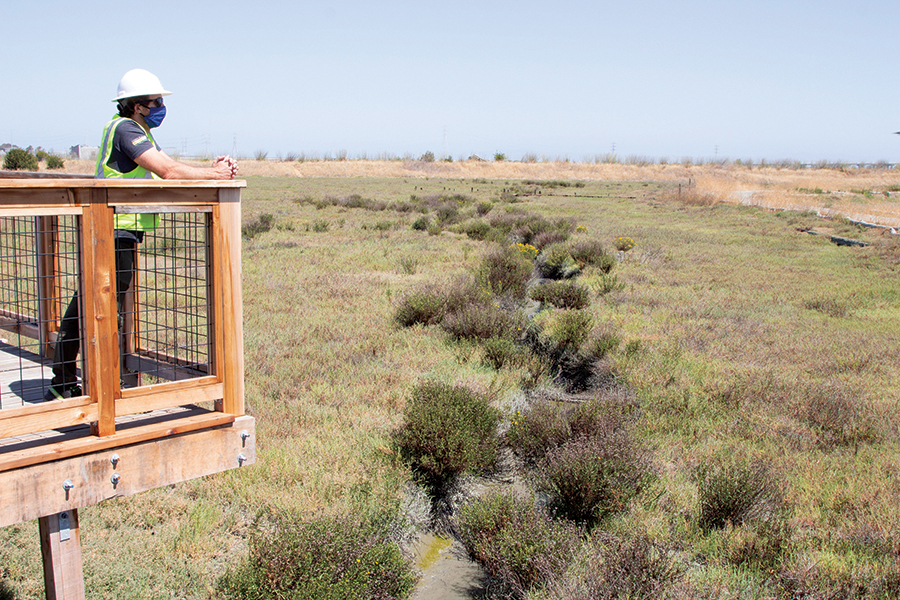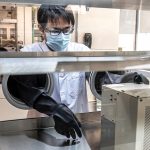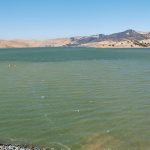
One of Together Bay Area’s Spring Summit sessions showcased projects that member groups worked on during the pandemic, including a newly completed segment of the Bay Trail that enhances access to Ravenswood Preserve, pictured here. Photo courtesy the Midpeninsula Regional Open Space District.
Together Bay Area has emerged from its chrysalis, and if its Spring Summit 2021 is indicative of its future, the organization is well-poised to lend cohesion and support to its 69 member groups as they tackle the complicated challenges of building climate resilient lands and communities.
Together Bay Area stands on the shoulders of the Bay Area Open Space Council, a network of land conservation nonprofits and public agencies that provided resources and support to its members for nearly 30 years. In 2018 the organization “hit some turbulence,” said Annie Burke, a former council staff member and the current director of Together Bay Area, during a phone interview. When the council asked stakeholders if it was time to close its doors for good, the answer was a resounding “No!”
To explore how the organization could best serve its members and hone its mission going forward, it formed a planning committee that included those with long careers in conservation, and others who were just starting on their journeys. Half of the committee identified as people of color, most were women, and tribal representation was included. “Who was at the table changed the conversation,” Burke told the Monitor. “The outcome was profound, thoughtful, and critical.”
Two meetings in particular stand out for Burke. One occurred in spring 2019 when Lorelle W.B. Ross, vice chair of the Federated Indians of Graton Rancheria, spoke to the committee about reciprocity, and what it means to be in relationship with a place and with each other. “Lorelle’s words got us out of a dominant white culture mindset and into thinking deeply about who we are and how we want to operate,” said Burke in the interview.
Another shift came as the planning committee processed feedback from a series of community-based listening sessions that took place in 2019. I attended one of these sessions and wrote a Monitor article about the importance of viewing open space through a regional lens. Two dominant themes emerged from the listening sessions attended by about 140 participants: climate change and the need for equitable access to land. Some on the planning committee were concerned that working on both issues would be difficult for a small organization, but others argued that the two were inextricably linked. “We need to heal our relationship with one another before we can heal our relationship with the land under us,” Burke told the Monitor, reflecting on Ross’s words spoken during one of the first planning meetings.
The organization changed its name to Together Bay Area, solidified its mission, and set aspirational goals that turned into practicable action when the coronavirus arrived like a freight train in spring 2020. In early March, the first cases of COVID-19 were reported in several Bay Area counties. By mid-March, more cases and the first deaths were reported. By the end of March, cases in the Bay Area had reached 2,000 with 50 people dead.
In response to the infection rate, six Bay Area counties issued shelter-in-place orders in mid-March, followed a few days later by the state. The weekend after the orders, several days of beautiful weather lured tens of thousands of people outside and overwhelmed park systems. Across the region, park managers wanted to know how their peers were handling the volume, and that led to a regular Friday online video chat facilitated by Together Bay Area, with over 25 managers discussing strategies and safety protocols, and learning from one another.
The seemingly runaway pandemic train is seeing a light at the end of the tunnel in California, but that doesn’t change the staggering numbers of coronavirus cases and deaths. As of May 24, the tally of cases in the Bay Area was 456,620 with 6,721 deaths, according to ABC News’s COVID-19 tracker.
COVID-19 was appropriately at the forefront of discussions during Together Bay Area’s Spring Summit 2021. Following in the tradition of Bay Area Open Space Council gatherings, Together Bay Area has hosted two gatherings since its launch, both virtual. Its most recent gathering was the Spring Summit in May 2021, and given the stress and anxiety of the past year, organizers wanted to insert some joy into the virtual arena. They came up with a winner by inviting OméDJ to kick things off and play during breaks. People were invited to dance in their isolation, and we did.
Besides COVID-19, there were plenty of other issues to discuss. Together Bay Area’s Tom Robinson proposed that the organization was in a good position to help California achieve its “30×30” initiative goals, established by executive order in October 2020 when California became the first state to support a federal resolution to protect 30 percent of U.S. lands and ocean areas by 2030. Another topic of discussion covered Assembly Bill 1500, a $7 billion climate resiliency bond co-authored by legislators Kevin Mullin and Eduardo Garcia, tentatively scheduled for the June 2022 ballot. “California is going to lead the way in climate resilience,” said Mullin, an assertion shared by several presenters.
Several members presented projects they had worked on during the pandemic. These included the completion of the newest section of the Bay Trail at Ravenswood Preserve, closing a 0.6-mile gap in 80 miles of existing trail on the San Mateo County shoreline. The combination paved pathway, elevated boardwalk, and bridge improves access to the bay for East Palo Alto and Menlo Park communities. Other projects included the formation of a Parks Equity Action Team for Santa Clara County Parks, and the 100+ Jobs project, a partnership between Sustainable Agriculture Education (SAGE) and California Community Colleges, which inspires young people to explore jobs in agriculture, food, water, and the environment.
In one summit session, Burke interviewed Rohan Radhakrishna, a medical and public health doctor who is the new deputy director of the Office of Health Equity at the California Department of Public Health. “Basically, I hung up my stethoscope and am working on the overlapping crises of our time, which are unequivocally climate change and racial equity and socioeconomic inequity,” he said.
At the top of the interview, Burke asked Radhakrishna how he was doing.
“I’m not okay,” he admitted. The previous night his five-year-old son had a nightmare in which another kid had tied a rope around his neck. Before bed that night, they had been reading a children’s biography of Martin Luther King Jr.
“I’m not okay,” he repeated, because the previous week his eight-year-old daughter had expressed concern for his wife of East Asian descent who walked to work in San Francisco.
“And I’m not okay because in the past minute more than a hundred people have died in my motherland, India, due to COVID-19. As my friends on social media are joyously returning to normalcy, eating out, gathering, our sisters and brothers elsewhere on the planet are massively dying.” As of May 24, there were 26.8 million cases of COVID and 304,000 deaths in India, which is still fewer than the case numbers and deaths in America.
Radhakrishna and Burke talked about the impact of the lockdown on people’s health, the importance of getting outside for physical and mental well-being, and the need to tackle racism, the root cause, he said, of inequity.
Radhakrishna told Burke that he also wanted to talk about love. “As a doctor and a public health worker, and a fellow human being, I believe that love is the oldest and most powerful medicine to heal our bodies, our minds, and our relationships,” he said. “This has been a trying time when hate and violence are very visible, and so I want to make love equally visible. We can’t protect what we don’t love, and we’re not going to stand up and fight for, and protect, each other or this planet, if we don’t love each other.”
The presentations from Radhakrishna and others at the summit offered promise for making progress on the complicated issues that we face today. The people who came to the table were diverse, passionate, and not afraid to mention the importance of love.
“The world has changed so much over the past year and a half,” Burke told the Monitor. “I think Together Bay Area is well positioned to help connect, convene, and lead our members and the broader Bay Area community to meet this moment. We’re in a good place, but the work of caring for an organization is never done.”
Aleta George covers open space for the Monitor.

